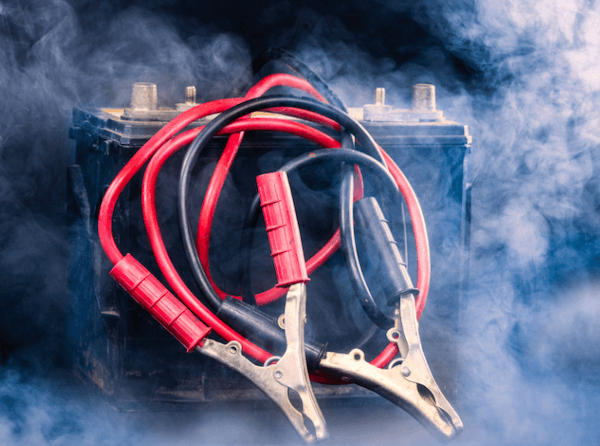How to Protect Your Car Battery from the Heat
Auto Shops Located in: Chapel Hill, Durham, Taleigh, Apex, and Cary North Carolina

Is your car battery struggling to start this summer? If so, you are not alone. The summer heat can destroy your vehicle’s battery from the inside out—leaving you stranded. So how can you keep your car battery protected? Here is a look at battery heat protection from your local mechanics here at Chapel Hill Tire.
Why Do Batteries Fail in the Summer?
The summer heat is notorious for killing car batteries. So why do batteries die in the summer? The heat can create a perfect storm for battery trouble, with several stressors working simultaneously:
- Internal evaporation: Your car battery relies on electrolytes (typically water and sulfuric acid) to fuel its internal chemical process. These vital liquids begin to evaporate in the summer heat. Without these fluids, your battery will inevitably begin to fail.
- Corrosion: High heat and liquid evaporation also accelerate natural battery corrosion and oxidation.
- Sulfation: After every battery recharge, small amounts of lead sulfate remain on the lead plates found in most batteries (this process is called sulfation). The heat can also accelerate sulfation, which leads to battery failure.
- Overcharged batteries: The heat can cause your battery charging system to malfunction, overcharging your battery. Much like all of your electronics, overcharging can lower the lifespan of your battery.
Beyond the Summer: Lasting Car Battery Troubles
The damage of the summer heat will stay with your car battery long after the weather cools down. In fact, the summer heat is often responsible for battery failure in the winter. Many car batteries die in the winter—and drivers mistakenly blame the cold weather. But the cold temperatures do not actually damage your battery.
To be fair, the cold does cause your car battery to lose some of its power by slowing down its electrochemical process. It also makes your vehicle require a little extra charge to get started due to the cold slow-moving engine oil. However, your battery will structurally remain unaffected by the cold, and a healthy battery can handle these challenges with ease. So even if your car battery survives through the summer, a heat-damaged battery will likely fail when facing the challenges of the winter season.
How to Protect Your Car Battery From The Heat
Thankfully, there are some quick and easy steps you can take to keep your car safe from the heat. Here are 9 tips for protecting your car battery during the summer:
Battery Car Care Tip 1: Garage parking
When possible, park your car in the garage. While garages are often not cooled by air conditioning, they help your car beat the heat by keeping it away from the sun. Your garage can also help protect your car from other hazards, such as catalytic converter theft and pollen—so it is best to make use of your garage whenever you can.
Battery Car Care Tip 2: Parking in the shade
When an enclosed garage is not available, your next best option is shade. Trees, buildings, and other shade providers can keep your vehicle from facing direct sunlight, which the EPA reports can leave surfaces 20-45℉ cooler than unshaded surfaces. Consider parking underneath a shaded area, when possible.
Battery Car Care Tip 3: Car covers
Similar to garage and shade parking, you can keep your car protected from the heat with an all-weather vehicle cover. These covers will work to deflect heat and protect your car from the effects of UV rays. It is best to put this cover on after giving your car time to cool down or dry off so it does not trap in any heat or moisture.
Battery Car Care Tip 4: Watch out for corrosion
Corrosion on your battery can quickly drain its power and shorten its lifespan. It can also prevent your battery from sending electrical signals to your engine. If you see your battery corroding, check with a mechanic to see if cleaning or replacing your terminal ends will help. If not, you may be due for a battery replacement.
Battery Car Care Tip 5: Mind your car battery usage
No matter the time of year, you can overextend your car battery by leaving lights on, chargers plugged in, or using vehicle features (like the radio) when your engine is off. While you are driving, your alternator takes over some of the work involved in powering these features. However, after you turn off your engine, this work falls back on your battery. While you might like to sit in your air-conditioned car and listen to the radio or talk on the phone after turning off your engine, doing this excessively can shorten your battery lifespan. You should also double-check to ensure that you unplug your chargers and turn off your lights after each usage.
Battery Car Care Tip 6: Radiator fluid flush
Your radiator is responsible for keeping your engine cool, which protects your car parts (like your battery) from overheating. Your battery will face worsened heat damage without a properly functioning radiator. Not to mention, you can risk costly car problems and even complete engine failure without your radiator. As such, it is essential that you make sure you are up-to-date on your radiator maintenance flushes.
Battery Car Care Tip 7: Starting system check
When your starting system is due for care, it will require more power and energy to function. A failing alternator will also not recharge your battery as you drive. This can put more stress and strain on your car battery. If you think something is amiss in your starting system, bring it in for a test/check. It is also helpful to keep a jump-starting pack or jumper cables in your car—just in case. Here is our 8-step guide to jump-starting your car.
Battery Car Care Tip 8: Check your water levels
Some batteries contain a water level indicator that tells you how much evaporation your battery has faced. While your battery is sealed and you cannot refill it, knowing your battery is low on water can help you prolong its lifespan by being extra mindful of heat exposure. It can also allow you to get a car battery replacement before you are left stranded with a dead car battery. (You can also keep an eye out for these 4 signs you are almost due for a battery replacement).
Battery Car Care Tip 9: Smart driving patterns
Your alternator recharges your battery as you drive. If you leave your car dormant for extended periods, it will drain your battery and shorten its lifespan. Similarly, short stop-and-go trips will use more power than your battery can replenish. You can protect your battery and prolong its lifespan by taking the scenic route every once in a while as you run errands.
Chapel Hill Tire Vehicle Battery Replacement Services
The local auto mechanics at Chapel Hill Tire are here to help you with all of your car battery needs! Whether you need a new car battery, replacement terminal ends, or another starting system service, we have you covered.
Are you stranded with a dead car battery? Our mechanics will come to you! With our vehicle pick-up and delivery mechanic services, the Chapel Hill Tire experts will come to your home or work, jump-start your battery, and bring it back to our shop for a replacement—no AAA fee required.
Chapel Hill Tire proudly serves the greater Triangle area with our 9
locations across Raleigh, Durham, Carrboro, Chapel Hill, and Apex. We also commonly serve drivers from nearby cities, such as Cary, Wake Forest, Pittsboro, Knightdale, and beyond! You can explore our
coupons page,
make your appointment here online, or give us a call to get started today!















